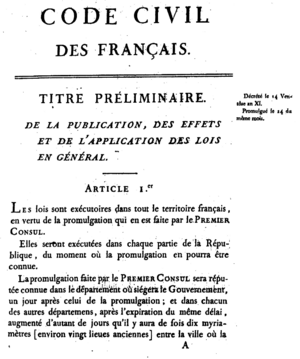Legal code facts for kids

A legal code is a written collection of laws. When we "codify" laws, it means we write them down in an organized way. This makes them clear and easy to understand.
Legal codes are usually created by a legislature, which is a group of people who make laws for a country or region.
Contents
What is a Legal Code?
A legal code is like a rulebook for a country. Instead of just having many separate laws, a code brings them all together in one place. This helps everyone know what the laws are and how they apply.
- It makes laws easier to find and understand.
- It helps judges make fair decisions because the rules are clear.
- It ensures that laws are applied equally to everyone.
Why Do We Need Legal Codes?
Imagine playing a game without clear rules written down. It would be confusing, and people might argue about what's allowed or not. Legal codes work the same way for a country. They help keep things fair and orderly.
- Fairness: When laws are written down, everyone can see them. This helps make sure that laws are applied fairly to all citizens.
- Order: Codes help keep society organized by setting clear rules for how people should behave and how problems should be solved.
- Knowing the Rules: People can easily find out what the law says, which helps them follow it.
Famous Legal Codes in History
Legal codes have been around for a very long time. They show how different societies have tried to organize their laws.
The Code of Hammurabi
One of the oldest known legal codes is the Code of Hammurabi. It was created in ancient Babylonia around 1754 BC by King Hammurabi. This code was carved into a large stone pillar, making it visible to everyone. It covered many parts of daily life, from business deals to family matters.
The Napoleonic Code
A very important modern legal code is the Napoleonic Code. It was created in France in 1804 under the leadership of Napoleon Bonaparte. This code brought together many different laws into one clear system. It was so well-organized that many other countries later used it as a model for their own laws.
- It emphasized equality before the law.
- It protected private property rights.
- It influenced legal systems across Europe and beyond.
How Legal Codes Are Made
Creating a legal code is a big job. It usually involves many steps:
- Research: Experts study existing laws and traditions.
- Drafting: Lawyers and lawmakers write down the new laws in a clear and organized way.
- Debate and Approval: The proposed code is discussed and voted on by the legislature.
- Enactment: Once approved, the code becomes the official law of the land.
Legal codes are living documents. They can be changed or updated over time as society changes and new needs arise.
See also
 | Madam C. J. Walker |
 | Janet Emerson Bashen |
 | Annie Turnbo Malone |
 | Maggie L. Walker |

